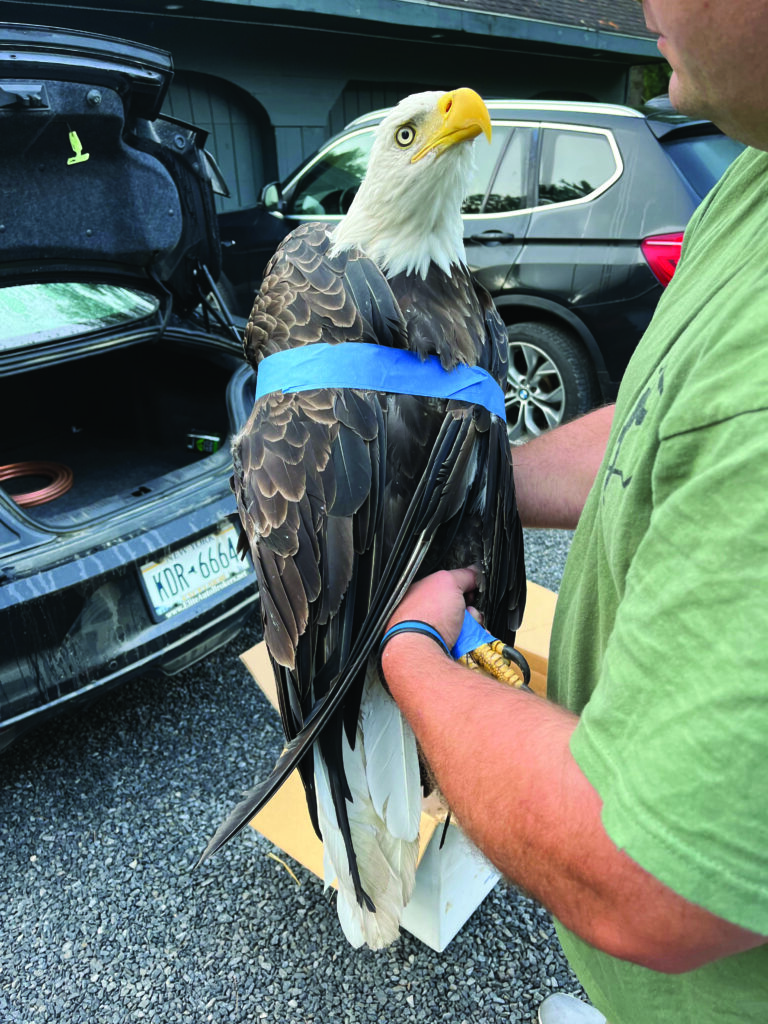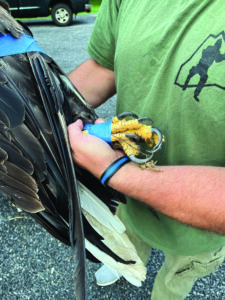Wild Things Get Rescued
By Carrie Thompson

When you find a wild raptor wounded, ill or otherwise incapacitated WHO you gonna call?
Mike Stalter!
Mike Stalter, a deputy in the Otsego County Sheriff’s Office, possesses a general falconry license. He is well known in the community as the first point of contact for handling raptors, which include owls, falcons, eagles and hawks. This is the second downed eagle that Mike has rescued, this one in response to a 911 call from a painting party gathered at Brookwood Point on Otsego Lake. The dispatch contacted Mike and thankfully he was available to respond to the injured female bald eagle.
He carefully approached with one hand extended, calmly speaking to her. While she was watching his one hand, he was able to reach around with the other and secure one talon, and very quickly the other. Mike states that handling any raptor is very dangerous and requires years of training and specialized skill. Aside from the obvious threat of the sharp talons, eagles can apply 650 lbs. of pressure slicing through skin and bones “like butter.” He wrapped the wings and legs in blue painter’s tape, secured her in a box and contacted the Environmental Conservation Police. She was delivered to Charles Koop, who owns and operates a local volunteer wildlife rehabilitation center affectionately known as the “Dr. Doolittle Farm” in Pittsfield.
The eagle had sustained a fractured femur and was then transported to Cornell University for surgery. The team there is “hopefully optimistic” for her full recovery and eventual reintroduction back to her home territory at Brookwood Point.
A falconry license is issued by the DEC Special Licenses Unit by completing sequential levels of study, Apprentice, General and Master. An apprentice successfully undergoes a written examination, and must train under the sponsorship of a general or master falconer. Mike was able to obtain the sponsorship From Charles Koop, a master falconer. One must additionally acquire the proper equipment and build a facility in code compliance passing an inspection conducted by the DEC. By successfully completing all these steps, the apprentice may legally acquire one raptor, during which time one hunts and trains with their bird for at least four months out of a required two-year apprenticeship period.
To obtain the first raptor Mike explains that the bird must be under one year of age, wild-caught and without injury using a simple bait trap. A detailed report of capture is then filed with the state. After the 2-year period one is eligible to advance to general certification, Mike’s current level, and permitted to own 3 raptors. The third level is master falconer. This level stipulates five years of experience, requires a field evaluation by 3 master falconers, and if approved allowed to possess up to 13 raptors. To put the requirements of time, talent and dedication in context Charles Koop received his apprentice falconry license in 2006 and his masters in 2015.
Falconry is a state-regulated hunting sport that requires a small game hunting license. Mike clarifies that falconry is better defined as a hunting partnership existing between the two species. The bird is the hunter. The unique relationship between falcon and falconer is built on trust and a stable bond develops over time by working together in the field. A falconer can hunt with the bird in season. The hawk is mostly a ground fur hunter, so typical prey is smaller game like rabbits, squirrels etc. A falcon is mostly an aerial hunter, its primary prey is other birds. The specifics of hunting protocols wonders if the owner takes the catch from the falcon or is delivered like a bird hunting dog dropping the quail at his master’s feet? Mike states emphatically that “if you ever take the prey from the falcon, they will hate you. Forever.”
Clearly, a very fragile relationship exists between the two as Mike explains that when a bird is released it knows its free.
“They will not come back if you are not a benefit to them, so every time the bird flies it has choice to return to you or not.”
Mike does not hood his birds, but it is a common practice meant to calm them into thinking its night. The greatest predator to the raptor is other raptors, specifically the great horned owl, which is an active night hunter. The birds, through adaptive survival instinct, become very still, moving as little as possible to remain undetected during the dangerous hours. Mike states that in his experience “the more the bird sees me and understands that I’m not going to allow any harm to come to them” he becomes the calming factor.

Another falconry tool is the use of a bow perch, which gives landing safety to the bird and human. Absorbing the landing impact on your arm or hand, is described by Charles Koop as a “big can of green beans with nails all over it hurling at you in a dive of 200-230 miles per hour.” So, while not movie-image sexy, training the bird to land on a perch rather than the gloved arm appears to be the sensible way to go.
“I never saw a wild thing sorry for itself. A small bird will drop frozen dead from a bough without ever having felt sorry for itself.” — DH Lawrence
One look into those eagles’ eyes and you know immediately those eternal poetic words are totally on point. Looking into Mike Stalter’s eyes we see focused responsibility, appreciation and respect for all things wild and free. It is a beautiful image of shared tenuous trust as they take mutual stock of one another in the intensity of the moment.
Trust, according to the Oxford English Dictionary, is “firm belief in the reliability, truth, ability, or strength of someone or something”.
Trust. Hard to earn and easily lost. Trust. Hard to earn and easily lost.

